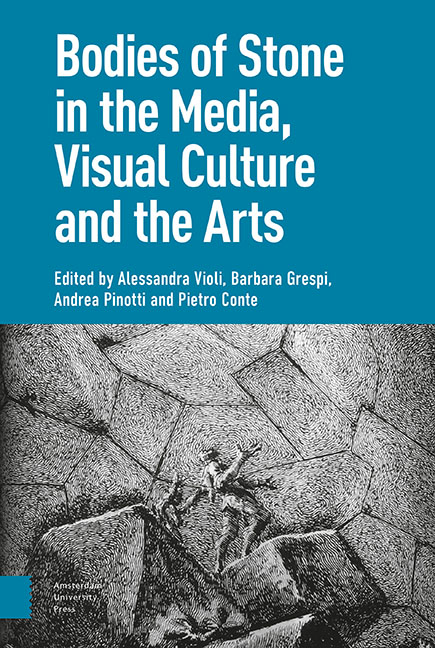Book contents
- Frontmatter
- Contents
- Introduction: Learning from Stone
- I Statue: The Imaginary of Uncertain Petrification
- 1 Theatre and Memory: The Body-as-Statue in Early Modern Culture
- 2 Translated Bodies: A ‘Cartographic’ Approach
- 3 Pantomime in Stone: Performance of the Pose and Animal Camouflage
- 4 Animated Statues and Petrified Bodies: A Journey Inside Fantasy Cinema
- 5 The Ephemeral Cathedral: Bodies of Stone and Configurations of Film
- II Matter: Size, Hardness, Duration
- 1 Bodies That Matter: Miniaturisation and the Origin(s) of ‘Art’
- 2 Brancusi’s ‘Sculpture for the Blind’
- 3 Cinema, Phenomenology and Hyperrealism
- 4 Ephemeral Bodies: The ‘Candles’ of Urs Fischer
- 5 The Celluloid and the Death Mask: Bazin’s and Eisenstein’s Image Anthropology
- III Corpse: Fossils, Auto-Icons, Revenants
- 1 Funeral Eulogy: Post-Mortem Figures and Redeemed Bodies, in Images
- 2 On Jack Torrance As a Fossil Form
- 3 Technical Images and the Transformation of Matter in Eighteenth-Century Tuscany
- 4 Glass, Mixed Media, Stone: The Bodily Stuffs of Suspended Animation
- 5 Bodies’ Strange Stories: Les Revenants and The Leftovers
- IV Monument: Embodying and Grafting
- 1 The Impassibly Fleshly, the Statue of the Impossible
- 2 Frozen into Allegory: Cleopatra’s Cultural Survival
- 3 The Orphan Image
- 4 The Well-Tempered Memorial: Abstraction, Anthropomorphism, Embodiment
- 5 Monuments of the Heart: Living Tombs and Organic Memories in Contemporary Culture
- Index
2 - Frozen into Allegory: Cleopatra’s Cultural Survival
Published online by Cambridge University Press: 20 November 2020
- Frontmatter
- Contents
- Introduction: Learning from Stone
- I Statue: The Imaginary of Uncertain Petrification
- 1 Theatre and Memory: The Body-as-Statue in Early Modern Culture
- 2 Translated Bodies: A ‘Cartographic’ Approach
- 3 Pantomime in Stone: Performance of the Pose and Animal Camouflage
- 4 Animated Statues and Petrified Bodies: A Journey Inside Fantasy Cinema
- 5 The Ephemeral Cathedral: Bodies of Stone and Configurations of Film
- II Matter: Size, Hardness, Duration
- 1 Bodies That Matter: Miniaturisation and the Origin(s) of ‘Art’
- 2 Brancusi’s ‘Sculpture for the Blind’
- 3 Cinema, Phenomenology and Hyperrealism
- 4 Ephemeral Bodies: The ‘Candles’ of Urs Fischer
- 5 The Celluloid and the Death Mask: Bazin’s and Eisenstein’s Image Anthropology
- III Corpse: Fossils, Auto-Icons, Revenants
- 1 Funeral Eulogy: Post-Mortem Figures and Redeemed Bodies, in Images
- 2 On Jack Torrance As a Fossil Form
- 3 Technical Images and the Transformation of Matter in Eighteenth-Century Tuscany
- 4 Glass, Mixed Media, Stone: The Bodily Stuffs of Suspended Animation
- 5 Bodies’ Strange Stories: Les Revenants and The Leftovers
- IV Monument: Embodying and Grafting
- 1 The Impassibly Fleshly, the Statue of the Impossible
- 2 Frozen into Allegory: Cleopatra’s Cultural Survival
- 3 The Orphan Image
- 4 The Well-Tempered Memorial: Abstraction, Anthropomorphism, Embodiment
- 5 Monuments of the Heart: Living Tombs and Organic Memories in Contemporary Culture
- Index
Summary
Abstract
This article explores the ambivalence at work in the cultural afterlife of Cleopatra on stage and on screen. Three aspects of the resuscitation of a political body frozen into a mythic signifier come into play: celebrity as a modern form of political charisma, theatrical spectacle as support of political power and imaginary projection as a tool for feminine self-performance. Shakespeare's late tragedy and Mankiewicz's Hollywood epic are the main texts discussed.
Keywords: Shakespeare's Antony and Cleopatra; stages corpse; political charisma; cinematic re-imagination; feminine sovereignty; monumentalism
Our cultural image repertoire has remembered Cleopatra as a transitional figure, suspended between a living embodiment of quasi-divine political power and the reanimation of a mythic signifier. In the historical chronicles of the ancient world, her demise marks the end of a political dynasty that served to consolidate the hegemony of Roman rule. Significantly, the image most readily associated with this last Egyptian pharaoh is that of her beautiful corpse, either exposed as a naked body with a snake at her breast or placed on public display in full funeral regalia. Over her dead body, the Roman ruler, Octavius, came to celebrate the triumph of his political ideology by erecting a monument to precisely the embodiment of the foreign but fascinating culture of the East, which he had finally successfully vanquished. Indeed, it is important to remember that we know very little about the actual historical Cleopatra, have little factual evidence of what she looked like. Instead, most research on her cultural afterlife draws attention to the way she functions as an enigmatic ruler, to whom we have access only through a long tradition of posthumous representations that divest Cleopatra of historical specificity so as to have her signify the tragic death of a fated political seductress. For this reason, it is also important to recall that her cultural survival has its beginnings in Octavius’ propaganda, whose purpose was to salvage the name of his countryman, Antony. Having successfully brought about the downfall of his rival, Octavius needed the Egyptian queen to take the full blame for the defection of the warrior with whom he had initially ruled Rome.
- Type
- Chapter
- Information
- Bodies of Stone in the Media, Visual Culture and the Arts , pp. 305 - 316Publisher: Amsterdam University PressPrint publication year: 2020



